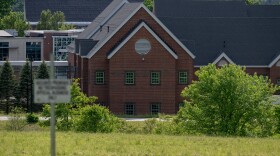This story was originally produced by the New Hampshire Bulletin, an independent local newsroom that allows NHPR and other outlets to republish its reporting.
The state’s new secure facility for at-risk youth won’t have more than 18 beds, as lawmakers demanded, but it will be bigger and cost more than the $21.6 million budgeted. That’s largely due to the needs of the teenagers who will be there, according to Morissa Henn, deputy commissioner of Health and Human Services.
Henn said the department is seeing more gang members, who can often require more space because they must be “sight and sound” separated from residents in rival gangs. The number of youth at the current facility has also increased, from last year’s daily average of 12 to 19, DHHS Commissioner Lori Weaver told lawmakers this month.
And more residents, who can be as young as 13, are being held longer, some on serious offenses that require they stay until they can be transferred to adult court at 18, Henn said. It became important, she said, for the design team to think beyond space for just basics such as bedrooms, bathrooms, and common areas to include educational and vocational programming and room to live, not just stay.
“The reality is this is going to be their home. To be too small is not ideal for any person in their living quarters,” Henn said. “You want to get it just right so it has a residential feel, so it has a highly trauma-informed feel, but also so that individuals have space to breathe when they need that. We just didn’t want to err too small on the residential end.”
The project has expanded from 25,000 square gross footage to 32,000, Weaver told lawmakers.
The department is expected to seek permission from the Executive Council Wednesday to use $6.5 million in unspent federal COVID-19 assistance to cover increased project costs. The money had been set aside to respond to a coronavirus surge last winter that didn’t happen.
Henn said the department confirmed it can repurpose the money to address other challenges triggered or exacerbated by the pandemic, such as mental health needs.
The Joint Legislative Fiscal Committee overwhelmingly approved the request earlier this month.
Currently, youth between 13 and 17 who are ordered held by the courts for offenses are placed at the 144-bed Sununu Youth Services Center in Manchester, either until they go before a judge or after they are committed, typically for several weeks or months, depending on the circumstances.
As the state has worked to divert juveniles from detention, into community services and mental health treatment, the building has become far bigger than needed.
For years, youth advocates, mental health providers, and civil rights groups have wanted to replace the enormous detention facility with a much smaller therapeutic setting that is secure but feels more like a home.
They resolved disagreements over the size and programming requirements this year with House Bill 49, which set aside $21.6 million to build a facility with 12 beds but space to surge to 18 if needed. Henn said the department hopes to have the new facility, which will be placed on the grounds of the state’s Hampstead Hospital, an inpatient psychiatric facility for youth, by the end of 2025.
That choice has raised concerns among lawmakers and local first responders, said Rep. Jess Edwards, an Auburn Republican who sits on a committee studying the potential impacts of putting a new secure youth facility on the grounds.
He said police have seen an increase in calls since the state purchased Hampstead Hospital last year and began admitting patients with greater mental health needs.
“We’ve had a rocky start up. I’m not going to sugarcoat that,” Weaver told the Joint Legislative Fiscal Committee Nov. 9, saying calls began to level off in September and October.
“It’s going to be a constant effort to make sure that the children are safe and that the facility is not disrupting the town and not (overburdening) the services in the town,” Weaver said. “We’re trying to strike that balance constantly. I’m confident we can get there. It’s gonna take us a minute though.”
Henn said the team designing the youth facility had proposed an even greater expansion. She said the department was able to reduce that by about half. Staff will not have private offices but instead share staff space at Hampstead Hospital, Henn said. That will keep staff on the floor with the youth and save costs.
But, the new facility must also meet the requirements laid out by the Legislature related to educational space, visitation areas, and clinical care.
“We don’t come to ask for this lightly,” Weaver told the fiscal committee. “This is obviously a serious ask. We know what was budgeted for it. But at the same time, I can’t tell you in good conscience that I can build a facility that is safe and meets those requirements with the $21 million (that was budgeted).”
New Hampshire Bulletin is part of States Newsroom, a network of news bureaus supported by grants and a coalition of donors as a 501c(3) public charity. New Hampshire Bulletin maintains editorial independence. Contact Editor Dana Wormald for questions: info@newhampshirebulletin.com. Follow New Hampshire Bulletin on Facebook and Twitter.






